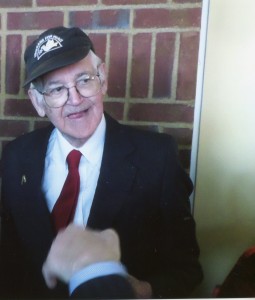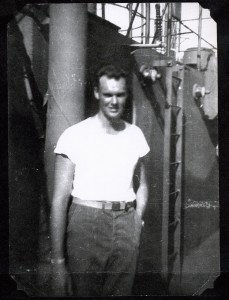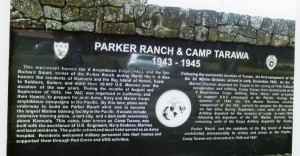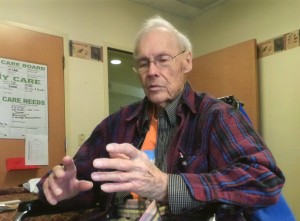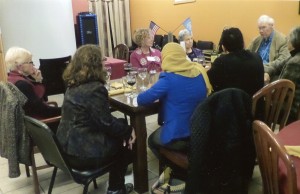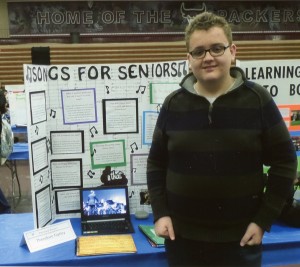Cathy and I were among 4,000 people who heard Hillary Clinton and Bernie Sanders each give long speeches in person at the Annual Minnesota DFL (Democrat Farmer Labor) Party Humphrey-Mondale dinner Friday night, February 12.
Here are their bios, as printed in the program booklet: Hillary & Bernie 2-12-16001
Both candidates were respectfully and enthusiastically received. (The snapshots below were taken by myself, and are “screen shots”, such as they are. We were halfway back in the very large hall, and screens were the only way to see the speakers.
(click to enlarge)
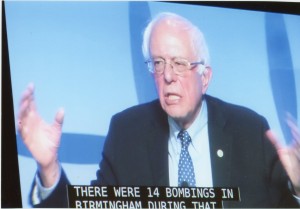
Bernie Sanders, St. Paul MN, Feb 12, 2016
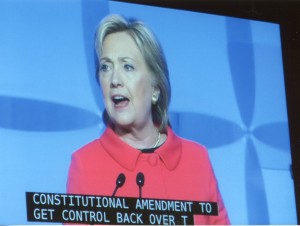
Hillary Clinton, St. Paul MN, Feb 12, 2016
Minnesota Senators
Amy Klobuchar and
Al Franken, and Governor
Mark Dayton, all publicly endorsed Hillary Clinton to the gathering. Cong.
Keith Ellison, also a speaker, has endorsed Bernie Sanders.
The comportment of all the speakers was very polite. I noted only one comment that I thought might be a “zinger” aimed at Hillary Clinton by Bernie Sanders. But it was a brief throwaway line, off the cuff, and probably few noticed. It related to the teleprompter on stage. Clinton had been campaigning in South Carolina earlier in the day; Sanders had been in the Twin Cities. On grueling campaign days, it can be understood that there is need for “cue cards”: which local people to speak about, how to pronounce their names, etc. (I remember a comment made about the long-time U.S. Senator William Langer of North Dakota. On the campaign trail, he’d come to a small town parade, and ask his local aide for the name of someone on the other side of the street, and then go across and deal with the individual on a first name basis, like a long lost best friend. A good tactic.)
Someone at my table noted that both candidates tended to look towards their right. This was the side where the cameras were. The candidates were there to speak to us; but great attention was obviously paid to the media, who would select what photos to use, and what quotes to publicize in last nights 10:00 news, or today’s paper.
Those of us in the hall had the unique privilege to see the entirety of both speeches and all ancillary videos, music and other speakers. The “news” version is always highly compressed. Mostly, most of us get the “news” version.
*
In the previous couple of days, friend Jeff sent along the below two items which I find are very interesting, assessing the now 7 years of the Obama administration.
1.
A video Chicago Tribune conversation with President Obama and several of his former colleagues in the Illinois legislature.
2.
The Nation He Built.
*
Personally, it is no secret that I first expressed a preference for Hillary Clinton at the DFL caucuses in early Feb. 2008. She was then, and even more so now, an extraordinarily competent candidate, very well prepared to lead this country in these extraordinarily complex times.
In 2008, after Barack Obama gained the Democratic nomination, I strongly supported him, and I still do. His Secretary of State for the first four years of his term was Hillary Clinton; these last few years, John Kerry has admirably filled the role of Secretary of State.
All these folks have made a quantitative and lasting and very positive difference in this country.
That is why, in my opinion, these Democrat candidates are both feared and hated by the denizens of the most radical right wing.
I have had zero reason to change my mind about the positive qualities of Obama and Clinton.
Of course, there are other assessments in this “blood sport” of politics, from the right, and, ironically, from elements of the far left.
Saul Alinsky called such strategies now employed by both left and right against Hillary as, “personalize, polarize and publicize”, and I think the left is being manipulated (and provided with ammunition) by those on the radical right who most aggressively hate and fear Hillary Clinton.
If Bernie’s candidacy stays strong, the attacks will escalate against him. It is how the political process (unfortunately, in my opinion) works.
*
Bernie and Hillary made powerful positive impressions last night.
Bernie looked and sounded tired: he is a year younger than I am, and going full bore at age 74, which he is, and will have to continue for at least the next many months, has to be extraordinarily difficult.
Cathy and I spent 7 hours of engagement yesterday to hear those two long speeches last night.
It will take a while to recover from last night. And for my age, I think I am a relatively high-energy person.
The President of the United States is the most complex and demanding position one could imagine. A relevant question, I think: could Bernie handle the demands?
Hillary Clinton for President.
I think Bernie Sanders would be an excellent choice for Vice-President when the time comes.
COMMENTS:
from Catherine: Yes to Hillary.
from Bruce: Unfortunately HRC is not a good candidate. She is her own worst enemy as her 2008 campaign attests to. She doesn’t seem to have learned much from that failed experienced this time around either. As for Bernie, age is a problem. The pace is only going to get faster. Whether he can handle it remains to be seen. In my opinion, Bernie is a gift from god to the Democrats. He’s become the voice of a movement that both the Clinton Campaign & the DNC are blind to. The same can be said for Trump on the Republican side. The difference between the two is the difference between Obi-Wan Kenobi & Darth Vader in STAR WARS. I don’t think Hillary can defeat Trump, if Trump is their nominee, but Bernie can. Bernie’s support is not Democratic once he’s gone so are they & many of them will end up with Trump. I hope the Democrats don’t look that gift in the mouth.
Here is an excellent piece. The videos in it are powerful.
from Carol: I agree with Bruce about Hillary. They both have their drawbacks (Hillary isn’t a “spring chicken” either, you know…) I’m impressed with the support from young people for Bernie. The attitude toward Hillary seems to be that she represents the past instead of the future, dynasties and all that, and maybe we’re not all that happy about 4 (or 8) more years of Bill. Yes, young people are more idealistic than practical. But remember, they put Obama in office.
Frankly, I swing back and forth about once a day in whom I will vote for… I think the bottom line is that if either Trump or Cruz is their opponent, we need to have chosen the one who can win. I’ve been kind of monitoring online postings on one website. It’s surprising the number of Republicans who say if Trump is on the ticket, they will consider voting for Bernie – but never for Hillary.
I seriously think if Trump is ever in the White House, it will be the end of our country as we know it. He’s already done an incredible amount of damage along the way. We have talked about leaving the country in that case, and we’re not alone.
But either Hillary or Bernie is w-a-y better than what the Republicans have put forth as their “cream of the crop.”
from SAK in England: In an earlier email you suggest that one of the remaining 9 candidates MAY win . . . are you suggesting that there might be a third (independent) candidate with a chance. Let us say the Democrats & Republicans field candidates D & R while a third independent candidate I is also in the running. Assuming D gets 40%, R gets 35% and I gets 25% of the electorate – hence none has an overall majority. The way I understand it is the House then decides who is to be the next president. The House belonging mostly to the famous 1% would pick the independent candidate especially if he were a successful rich businessman with Republican leanings. Is this correct & what are the implications for democracy when the candidate with least electoral votes becomes president!? Any precedents?
Response from Dick: The American electoral system can be confusing. There have been Independent candidates who’ve gotten quite a few votes. For example Ross Perot back in the time when Bill Clinton won over George H.W. Bush in
1992. Perot got a lot of votes, but no electoral votes. The U.S. system of electoral votes by state mitigates strongly against any minority party being any more than a nuisance. There may be a situation in modern history where a minority candidate even received an electoral vote. I don’t know of any.
I think the election situation today is such that most anything can happen, particularly at the Republican Convention in coming months. It is theoretically possible that the convention could nominate “none of the above”, favoring someone else. It’s far too early to guess at such a scenario, in the unlikely event it happens, but it could. The Convention will decide on the candidate if there is a deadlock within the Convention. It is highly unlikely that such a deadlock would occur within the Democrat Convention this year. There are, to my knowledge, no viable minority parties this year. Michael Bloomberg has threatened to run as an independent and could self-finance. Stay tuned!
from John: Isn’t this interesting? I watched the Republicans last night, They reminded me of little boys who think they rule.
I feel the Bern! When I was 18 years old I knew I was a democratic socialist. I have drifted both left and right as I grow and evolve.
Where you look at things from, determines what is seen.
And then, Is not the whole political thing reflective of our existing mass consciousness?
Let the clown show go on, and bring on the snake charmers, the three eyed man, the caged lion and the Cotton Candy vendor.
What are thinking people thinking? How will this all end? I’ll be at the DFL caucus, and my heart is with Bernie!
from Madeline: Dick, are you familiar with the following articles?
here,
here,
here and
here.
I am saddened by Clinton’s compromising before even starting a negotiation for change, which makes her small, and why Obama beat her in 2008; and her record of being party to what has probably cost a great deal more loss of life, such as in sabotaging Kofi Annon’s attempt at negotiating a peace for Syria; and supporting US-led “regime change” militarism.
I can’t seem to find where I found this, but some also argue Sanders is trying to bring the Democratic party back to its pre-Carter support for a more fair distribution of wealth–which has always been the best for the economy, while later Democrats & Bill Clinton have deregulated Wall Street, and increased poverty with “welfare reform.”
She has done remarkably well in a “good old boy” dominated world, and even if not perfect, as no one is, has had to be intelligent and tough to survive. I think she deserves some credit, and has experiences that prepare her well for the presidency, actually better than all the rest.
I’d like to support Clinton, and will if she gets the nomination, and know we would have to push her to do the right things if elected. I’d like to support her as the first woman president of the US.
I fervently hope that Sanders can physically survive the rigors of the campaign and the presidency if he is elected. I, at 72, wouldn’t dare take the risk, even though I am also healthy.
from Dick: Comment on Comments Feb. 17, 2016: None of the comments either surprise or upset me. In fact, one of the main reasons for printing my post is to encourage readers to give serious attention to their own reasons for favoring one or the other (doubtless the same could be said for the dwindling group of Republican contenders, but this is about Hillary and Bernie.)
Personally, I like Bernie. I also think that Hillary’s biggest liability is also her greatest strength to lead this country: being President of the United States is far more than standing for something. It is much more the art of forging agreements among very disparate opinions and beliefs. Last Friday somebody, maybe Hillary, essentially defined the dilemma: Progress is a Process. Too many opinion leaders, far left and far right, have a vision of controlling the agenda. It doesn’t work that way.
By accident, mostly, my worklife almost entirely was devoted to representing teachers in a teacher union in a state with collective bargaining. I worked for a state organization (I had a boss), represented local teachers in dealings with local school boards.
I was first and foremost an organizer. I never called myself that, but that is what I was. Others can say if I did things correctly or not, or made any difference, or created more problems than I solved…. I just tried to do the job I was faced with.
In a position like mine, the odds were almost certain that everything had to be negotiated. I had to deliver state or national priorities to locals who might feel differently about those priorities. In locals, before the first collective bargaining session, the local had to hammer out what it wanted to ask for, which was no easy matter: elementary teachers have differing priorities from high school teachers; coaches, special education, on and on. People on the bargaining teams could and did have vigorous arguments at all stages of the process.
And then, when you got to actually bargaining against a school board, an entirely new and different set of dynamics presented itself, depending to a large extent on who happened to be on the school board at the time.
Nothing was ever easy.
That is basically what moves me to support people best equipped to serve in positions where nothing is ever “right” to everyone.
First, the person with the ideals has to be elected by a majority of the electoral votes from the 50 states; then the task becomes accomplishing some goals against an often aggressive opposition, as we have constantly experienced in the time of Obama.
The debate at this point in the process is good.
Sooner or later, the reality will set in. Bernie knows it, Hillary, and all the rest, know it too.
Keep Talking.



